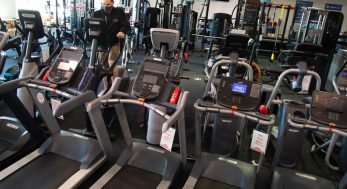Advertisement
Get to a nearby park and get in shape (safely).

Now that stay-at-home restrictions are easing, those of us interested in strong, healthy muscles but wearied by burpees in the living room may want to consider heading to the nearest reopened park or playground for weight training. Experts note that you can perform most standard exercises there if you’re willing to use your imagination — you can even recruit your children to help as giggling, resistance-adding workout partners. What follows are a few moves for a full-body, sun-drenched routine. (Wear a face mask, observe social distancing and use gloves or hand sanitizer to protect yourself and others, of course.)
In the park, look for a tree narrow enough to encircle with your arms. Hug it. Then squat, bottom out, knees bent to almost 90 degrees. Hold a few seconds and repeat the full squat or pulse shorter ones, moving up and down rapidly a few inches at a time. As Dana Bolling, a personal trainer in Chicago and a former Division I soccer player, explained, “You just took your barre class outside” and worked muscles in your thighs and backside. You can perform the same exercise using a basketball hoop or light pole, she said.
Instead of lounging on it, a park bench (in good repair) can be used for for “step ups, box jumps and hands-elevated push-ups,” said Adam Rosante, a New York-based personal trainer. In non-gym jargon: Face the bench and rapidly step onto and off it, first with one foot then the other. The fit and well-coordinated might try it with both feet together, hopping.
For upper-body strengthening, face the bench from far enough away that when you lean against it, your arms and back are straight. Lower yourself toward the bench by bending your elbows until your chest almost touches the bench. Push back up. Repeat until your upper arms start to wobble like noodles.
Park benches and low playground equipment also work well for dips, which strengthen the upper-arm muscles, said Jeremy Loenneke, an assistant professor of health, exercise and recreation science at the University of Mississippi in Oxford. Situate yourself at one end, back to the bench, with your arms holding the edge of the bench behind you. Then lower yourself until your elbows are bent to about 90 degrees. “The movement can be made easier by bringing the feet closer,” Dr. Loenneke said, “or more difficult by walking the feet out further.”
One of the best resistance exercises, pull-ups work your entire upper body and midsection. You could use tree branches, but their health and carrying power can be suspect, so better to head for the monkey bars at the playground. (You should also check with your local parks and recreation department to find out if public playgrounds have reopened and whether adults are welcome.) Grab the bar about shoulder-width apart, palms facing out, and pull yourself up. Here’s a good playtime opportunity for toddlers who are game: For greater resistance, swing your little one onto your shoulders before starting, creating a piggyback pull-up, said Simon Walker, a professor of exercise science at the University of Jyvaskyla in Finland. Afterward, perhaps, drop down gently and try some piggyback push-ups, he said.
If you cannot complete a pull-up — and many of us cannot — try lifting both of your legs while you hang from the bars, Ms. Bollig said, either with or without your knees bent, which works the upper body and midsection.
Finally, bear in mind that to our muscles, weight is weight, Dr. Walker pointed out, whether it comes in the form of a barbell or a boulder — our biceps, glutes, quads and other muscles will strengthen and grow similarly in response to lifting either. So, look for natural weights in the park or playground, including branches, logs and stones. Heft them “the way you would dumbbells or kettlebells,” Mr. Rosante said. “Use them to add weight on a variety of squats, lunges, hip thrusts and overhead presses.” If you hold a rock in each hand during these moves, make sure that they are of about the same weight, for balance.
Tire swings, too, can double as dumbbells, Mr. Rosante pointed out. Hold the tire by your side with one hand and shrug your shoulder up, for a “single-arm shrug”; or stand sideways to it, grasp, twist and raise it for “low to high woodchoppers”; or pass it to a partner like a medicine ball.
And should all of these exercises start to become easy and familiar, “set a timer for 10 minutes and see how many times you can make it through the entire playground,” Mr. Rosante suggested, a workout that should challenge the fittest and be, he said, “seriously fun.”


